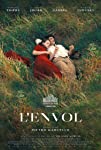Eye For Film >> Movies >> Scarlet (2022) Film Review
Scarlet
Reviewed by: Anne-Katrin Titze

Injustice and longing, the rules of the game of country life, cruelty and kindness, progress and nature are addressed in Pietro Marcello’s Scarlet (L'envol), which is an adaptation by the director with Maurizio Braucci (Marcello’s Martin Eden, Abel Ferrara’s Pasolini) and Maud Ameline (Mikhaël Hers’ Amanda), in collaboration with Geneviève Brisac of the 1923 novel Scarlet Sails by Russian author Alexander Grin, an antimilitarist and adventure writer. Archival footage of soldiers returning from the Great War on Armistice Day at the Somme, sets the tone for this remarkable tale of different kinds of love and everyday magic.
Scarlet (a highlight of the 60th New York Film Festival) tells the story of Raphaël (Raphaël Thiéry) returning from the front to the village where he lived. He is a big man with strong hands, a woodworker with great artistic talent and a love of music. His wife Marie had died in the meantime and he finds out that his baby daughter Juliette (Victoire Battist) is being taken care of by Madame Adeline (Noémie Lvovsky) who lives in a farmhouse outside the village. She offers Raphaël room and board and a platonic friendship that will last for years to come. Together with the family of a blacksmith (Antonin Stahly Viswanadhan, Inès Es Sarhir, Athénaïs Sifaoui-Blanc) she also takes in, they form an unusual and modern union of outsiders.

The score by Gabriel Yared (Anthony Minghella’s The Talented Mr. Ripley, Cold Mountain and a Best Music, Original Dramatic Score Oscar for The English Patient - all of which feature costumes by Ann Roth, who also won for The English Patient) is truly enchanting and reminiscent of Jacques Demy and Michel Legrand’s work. Peau D'Âne more than anything comes to mind, as both films take the fairy-tale premises and promises and unspool them without ever losing the sense of awe.
In Donkey Skin the most complicated and dire issues came wrapped in song, from incest escape routes to the sudden disturbing realization that the prince and princess don’t know what to do with all that love (they eat ice cream and roll down a hill eventually). The charming melodies were accompanied by lyrics of stark concerns. In Scarlet the contrast lies elsewhere. The swallow song Les Hirondelles has music set to anarchist writer Louise Michel’s poem from 1861 and it is the rediscovery of female voices from the past and once silenced that resonate.
Juliette shown to us at different youthful ages (Sienna Gillibert, Suzanne Marquis, Asia Bréchat) grows up in her extended family, learns what is important in life, and becomes a talented musician. She helps her father sell the remarkable wooden toys he makes to the owner of a toy shop (Rémy Roubakha) in town, which resembles that in Volker Schlöndorff’s adaptation of Günter Grass’s The Tin Drum. Shunned by the villagers, the grown-up Juliette (Juliette Jouan) receives an oracle by the local sorceress (Yolande Moreau) that one day a ship with red sails will take her to new adventures.
And indeed, an airship does fall from the sky, containing the handsomely moustached Jean (Louis Garrel) who woos Juliette with his charm and utterly modern outlook on interwar 20th century life. And yet, as is often overlooked, it is as in many fairy tales that the damsel is rescuing the prince. Don’t forget, Rapunzel, single mother of twins, thrown out from her home is the one who restores eyesight to the prince with her magical tears.
In Scarlet the couple meets swimming in a lake and as is the case in Beauty and the Beast, the story evolves around love for the father and love for a lover, a difference that needs to be sorted out. Garrel’s Jean seems a little perplexed that his charms don’t work more magic, but also relieved at the same time.
Folktales and their magical, wondrous approach to all the most troubling concerns in life are omnipresent in Scarlet. While Raphaël, who could have been played in the past by Michael Lonsdale or Michel Simon, has the spirit and craft of Geppetto. But Juliette is not a misbehaving wooden puppet with a desire to become a real boy. She is a real girl already and she knows it. Her decision not to pursue an education in the big city and stay with her father instead is completely her own and respected by everyone.
There are astounding moments of audio visual density that make Scarlet so wonderful a film - especially because we are bestowed with a generosity in spirit and utter lack of prejudice. The genre of the wonder tale, to some extent regarded as childish, is anything but. The magpie gets its say and so does the frog. Magic is quotidian, the leaves rustle, wars and rapists and swindlers come and go but the optimism in telling meaningful stories survives.
The film is also a celebration of craft, both on screen and in the making, Pascaline Chavanne’s excellent costumes (Leos Carax’s Annette, François Ozon’s By The Grace Of God) being a prime example. She is France’s Ann Roth. Raphaël’s outfits made me think of van Gogh’s Postman and the nautical figurehead he produces is fit to sail the seven seas. Labor politics also enter the picture, as a woman at the lumber yard complains of being paid less than the men.
In one of her takes on Cinderella, British writer Angela Carter had the heroine step into her mother’s coffin for it to turn into a coach and horses in preparation for the resurrection. In Scarlet, Juliette narrowly escapes her mother’s fate and manages to carve out a life for herself.
Winds are blowing and freedom is what we all desire. The ghosts of the past stand behind the window and the arsonists of the future are ready to strike - this is the space where Scarlet is located. The witchcraft of the past was often a special skill of marginalised women acutely aware of their surroundings. Wisdom, cruelty, decision-making - Scarlet makes us think and feel and maybe the feelings and the thoughts overlap. Nothing here caters to escapism, because war is looming, the past is never past, a big hand can protect a small one, and the wisdom of folktales should never be underestimated.
The wartime experience has been mostly different for men and women, often with men’s bodies scarred from battle and women’s from assault on the home front. As was the case for Martin Eden, the wars can easily merge into one great bloodshed. Fairy tales famously know this collapse of time, as people age decades in a sentence or sleep for 100 years. Scarlet pilots us to the wishing well of the past to obtain a glimpse of the future.
Reviewed on: 09 Oct 2022















